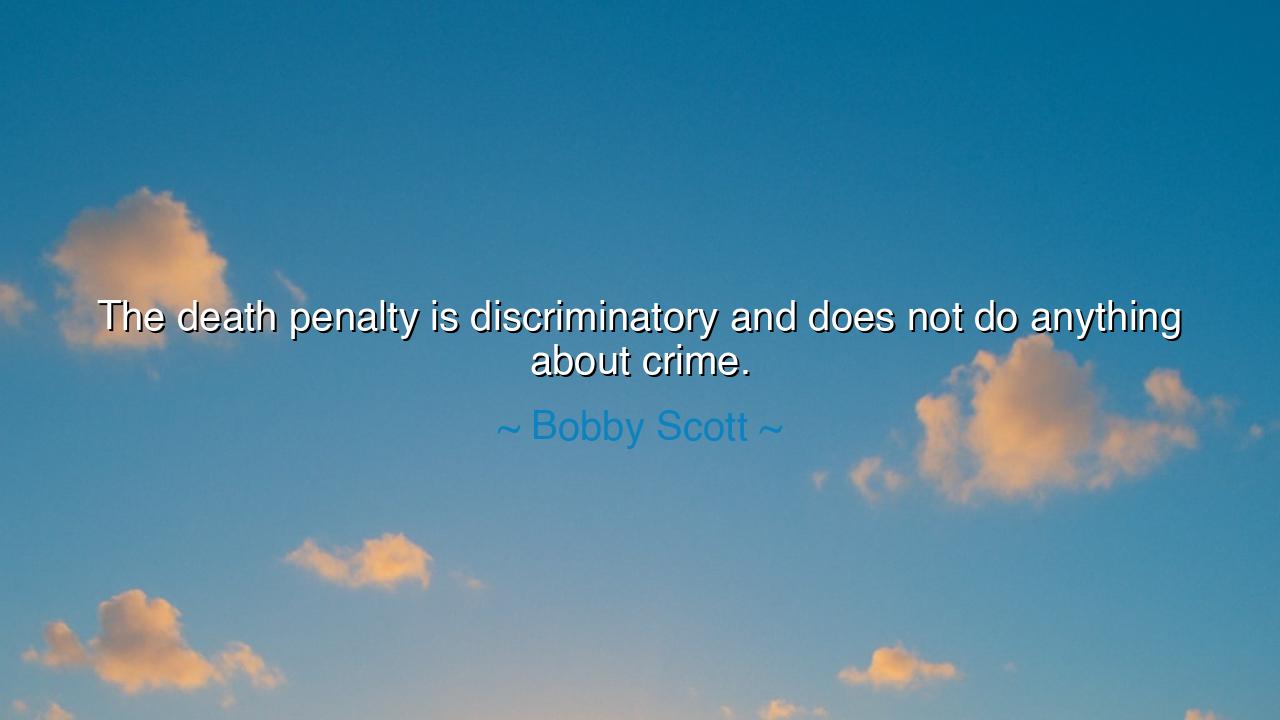
The death penalty is discriminatory and does not do anything






“The death penalty is discriminatory and does not do anything about crime.” These words, spoken by Bobby Scott, are not only a statement of policy but a cry from the heart of justice itself. They cut through centuries of vengeance and fear to reveal a deeper truth — that true justice cannot be built upon inequality or revenge. In this brief but mighty declaration, Scott exposes two ancient errors that still haunt humankind: the illusion that punishment heals, and the blindness that makes us punish unjustly. His words stand as both an indictment and an invitation — an indictment of the cruelty hidden beneath the veil of law, and an invitation to rise above it toward wisdom and compassion.
The origin of this quote lies in Scott’s lifelong work as an American lawmaker and advocate for criminal justice reform. Born into a time when the shadows of racial and economic inequality loomed large over the legal system, he saw firsthand how the death penalty was applied unevenly — falling most often upon the poor, the powerless, and the marginalized. His words echo the sorrowful truth that the gallows and the electric chair have not been instruments of balance, but mirrors of bias. When he says the death penalty is discriminatory, he means that it reflects not the purity of justice, but the prejudice of man.
From the dawn of civilization, humanity has sought to balance the scales of wrongdoing through punishment. Yet, as the ancients often warned, justice without mercy becomes tyranny, and punishment without understanding breeds only more suffering. The philosopher Seneca, who lived under the rule of emperors, once wrote that the greatest power lies not in the sword, but in restraint. He saw that the executioner’s blade does not deter evil; it only multiplies grief. In this same spirit, Scott reminds us that the death penalty “does not do anything about crime” — for crime does not spring from the existence of evil men, but from the soil of despair, poverty, and ignorance. To kill the criminal is to treat the symptom and ignore the cause.
History, too, bears witness to this truth. In many nations and eras, the death penalty has been wielded as a tool of control rather than of justice. Consider the story of Socrates, condemned to death not for crime, but for thought. His execution did not cleanse Athens of unrest; it revealed the city’s moral weakness. Or recall the Salem witch trials, where innocents were hanged in the name of purity — yet the fear that drove those killings did not vanish with the victims’ deaths. Again and again, humanity has learned — and forgotten — that violence cannot heal the wounds of violence.
Bobby Scott’s words also strike at the heart of human morality. To execute is to claim divine authority, to decide who deserves life and who deserves death. But who among mortals can make such a claim without arrogance? The ancients believed that life was sacred because it belonged not to the state nor to the mob, but to the gods themselves. When a society takes life in the name of justice, it risks becoming what it condemns. True civilization begins when mercy overrules wrath — when the people see that punishment must serve not the hunger for vengeance, but the hope for redemption.
There is another, quieter meaning hidden in Scott’s declaration. When he says the death penalty “does not do anything about crime,” he reminds us that fear does not transform the heart. The threat of execution may silence a man, but it cannot teach him virtue. Only compassion, education, and opportunity can heal the roots of wrongdoing. To build a safer world, we must not sharpen the sword, but strengthen the soul — both of the individual and of society. For every life spared is a chance for change; every act of mercy is a step toward peace.
So, my listener, let this be your lesson: justice without compassion is an empty shell. The measure of a people is not in how fiercely they punish, but in how deeply they understand. Do not seek safety through fear, nor righteousness through retribution. Instead, seek to heal where others would strike, to restore where others would destroy. For as Bobby Scott teaches, the true victory over crime is not found in the death of the condemned, but in the rebirth of the human spirit. And when justice is guided by mercy, when equality stands guard beside the law, then at last we shall begin to know what it means to be truly civilized.






AAdministratorAdministrator
Welcome, honored guests. Please leave a comment, we will respond soon